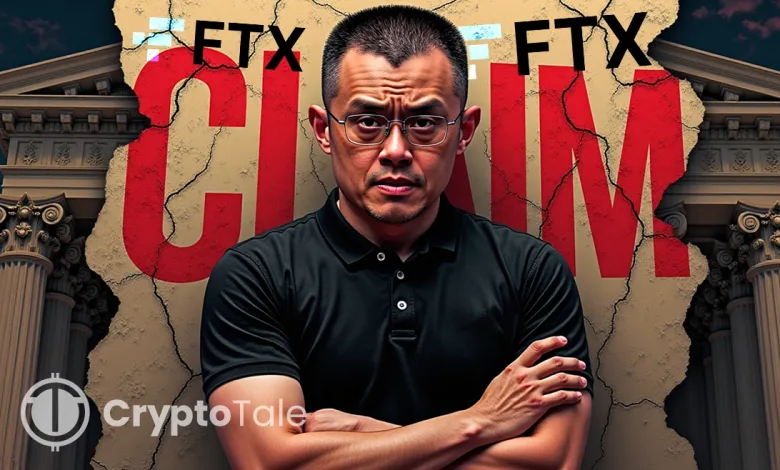Ex-Binance CEO Seeks Dismissal From $1.8B FTX Clawback Suit

- Zhao argues the $1.8B FTX suit falls outside U.S. jurisdiction and seeks full dismissal.
- Binance’s 2021 share repurchase deal with FTX faces scrutiny over fraudulently sourced funds.
- Zhao denies triggering FTX’s collapse, claiming posts exposed fraud, not caused its downfall.
Changpeng Zhao, former CEO of Binance, is pushing back against a $1.8 billion lawsuit from the FTX bankruptcy trust. On Monday, Zhao filed a motion in a Delaware court, seeking to dismiss the fraud-related claims against him. Zhao argues the claims don’t belong in a U.S. court because he lives in the United Arab Emirates. His lawyers said U.S. bankruptcy law shouldn’t apply to overseas deals between foreign entities. Zhao calls the lawsuit an improper attempt to blame him for Sam Bankman-Fried’s fraud.
Jurisdiction and Accountability Disputed
The dispute centers on a 2021 deal where FTX bought back shares from Binance using roughly $1.8 billion in crypto. The FTX trust says those funds were misused and wants them returned to repay creditors. FTX claims customer funds were involved in the buyback. The deal occurred before FTX’s collapse. Zhao and Binance received funds via offshore firms registered in Ireland, the Cayman Islands, and the British Virgin Islands.
Zhao says these facts prove the transactions fall outside U.S. legal reach. He argues he was only a “nominal counterparty” in the deal, not a direct recipient of the funds. His filing says he never had control or possession of the transferred crypto. The filing also claims that serving Zhao through U.S.-based lawyers violates bankruptcy rules. His team says the case fails to meet the requirements for a cross-border application.
Legal experts note this case has the potential to create new boundaries for how far the courts can go in tying executives for global crypto deals. The outcome may impact how global crypto leaders approach future business and legal risk.
Posts, Precedents, and Broader Implications
The lawsuit also references Zhao’s social media posts in 2022 during the FTX collapse. FTX claims Zhao’s post about selling FTT triggered mass withdrawals and fueled its failure. Zhao denies this. He says his post simply reflected Binance’s exit from a risky position. His lawyers argue that FTX collapsed due to internal fraud, not public comments.
They also say holding Zhao liable for those posts would set a dangerous precedent. They compare it to blaming a whistleblower for exposing a failing system. Zhao’s response adds to a growing number of dismissal motions tied to this case. Binance filed its own motion in May, calling the lawsuit “legally deficient.” Two former Binance executives also asked the court to remove them from the suit last month.
Related: CZ Disputes Warren’s Crypto Warning on U.S. Economy
The FTX trust is led by lawyers working to recover funds for creditors. They claim Binance and others should return what they received during the repurchase deal. This lawsuit comes after Zhao served four months in prison for violating U.S. money-laundering laws. Bankman-Fried is serving a 25-year sentence after being convicted of fraud in 2024.
The court must now decide whether to dismiss Zhao from the case or move forward with litigation. Industry observers say this case may influence how crypto firms manage risk in joint ventures and exit deals. It could also prompt regulators to rethink how they oversee cross-border exchange relationships. As courts weigh jurisdiction, safe harbor laws, and corporate responsibility, the case could redefine the limits of crypto accountability.




